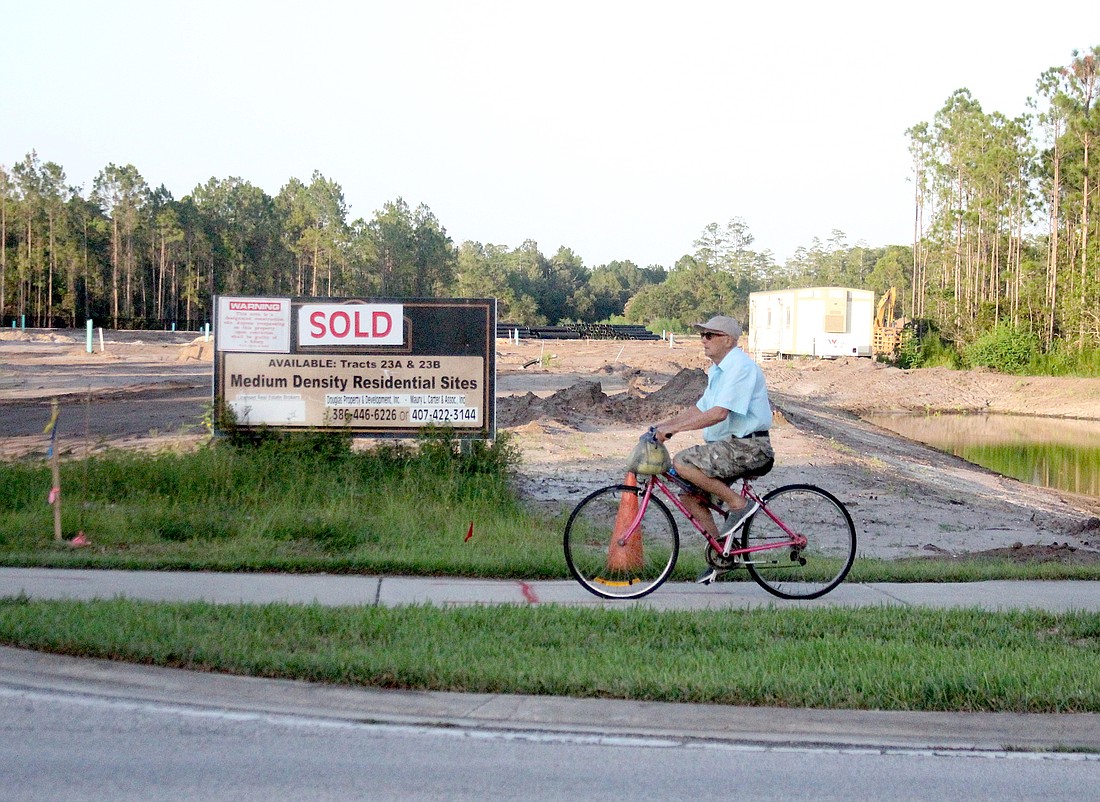- April 23, 2024
-
-
Loading

Loading

The city of Palm Coast’s Building Department fund is nearing the legal limit. As a result, building permit fees will immediately be reduced by 50%, Chief Development Officer Jason DeLorenzo told the City Council on Aug. 2.
The Building Department operates as an enterprise fund, meaning it is funded by permit fees only, and it can only use those fees to support the department; excess fees cannot be used for parks or roads, for example.
This fiscal year, which began Oct. 1, 2021, the Building Department has been running a surplus, thanks in part to a $350,000 reduction in budgeted expenses, unfilled positions and the work of interns. The surplus is mostly due to an increase in inspections, DeLorenzo said. From Oct. 1, 2021, to July 28, 2022, the city performed 54,229 inspections of various categories.
In total, as of June 30, the department had $2,611,704 in the bank. State law limits the amount, saying, “A local government may not carry forward an amount exceeding the average of its operating budget for enforcing the Florida Building Code for the previous four fiscal years.” The department’s current fund balance is 89% of the four-year operating budget average of $2,949,355.50 and is at risk of exceeding the maximum allowed by the end of the fiscal year, according to DeLorenzo’s presentation.
By reducing the permit fees by 50%, the city’s Finance Department predicts the fund will fall below $2 million in the next fiscal year, keeping the city in compliance with state law.
The level of service has been high: “If you call in an inspection by 7 a.m., we complete it every day, Monday to Friday,” DeLorenzo said. “It doesn’t matter how many inspections we have; we do them each and every day. They’re a hard working group — they stay late if they need to.”
City Council member Nick Klufas praised DeLorenzo and the Building Department staff for performing same-day service.
“That’s incredibly helpful to keep the process streamlined,” Klufas said.
City Council member John Fanelli thanked the Building Department for making sure “our dwellings are safe and that the work being done is being done appropriately.”
Mayor David Alfin asked DeLorenzo to encourage the builders to pass along the 50% permit fee savings to homebuyers, to help bring down the price of homes.
Alfin also pointed out that the majority of the permits are not for new homes; they’re for “little stuff, big stuff.” Of the 14,683 permit applications from Oct. 1 to July 28, fewer than 10% are for new homes. More than 20% of the permits were for new roofs.
“The big numbers are in additions, renovations, repairs,” Alfin said. “… It’s one of those things that helps protect the lifestyle of our community.”
Impact fees won’t be reduced; the 50% reduction is for building permits only.
“We’ll carry the reduction into the next fiscal year and manage it from there, and once we realize we are going to run below the $2 million amount, we will notice the public 60 days to let them know the fees will be adjusted,” DeLorenzo said.
Also at the Aug. 2 City Council meeting:
The City Council approved, on second reading Aug. 2, the application of Seminole Pointe, a development of 420 new homes and almost 90,000 feet of commercial space at a site north of the intersection of U.S. 1 and Seminole Woods Boulevard.
As reported by the Observer on July 21, the homes will be "horizontal multifamily" units such as duplexes and triplexes, and the rezoning shifts the boundaries between the commercial and multifamily areas of the site, making the multifamily section bigger.
Builders are charged 3.5% for automated clearing house transfers on payments to the city, and that can add up: On the average building permit cost of $17,000, that’s $595. Flagler Home Builders Association Executive Officer Annamaria Long asked the City Council on Aug. 2 to reconsider that fee. Compared with the process of having checks mailed to City Hall, the automated transfer reduces staff time, Long said, so there should be savings, not higher costs, associated with automatic transfers of funds.
After the meeting, Palm Coast Chief Development Officer Jason DeLorenzo said the 3.5% fee is part of the city’s contract with Paymentus; the city doesn’t receive the money from the fee. The contract for Paymentus was extended by a 3-2 vote, in May 2020, giving Paymentus automatic one-year extensions, with the right to cancel with six months’ notice.
Eleven residents spoke about safety on Cimmaron Drive, at the City Council meeting on Aug. 2, and all but one asked the city to add a sidewalk or otherwise improve pedestrian safety on the street.
Al Krier, who is a leader of resident group Safety on Cimmaron, asked the city to find funding for safety improvements. William Fining also asked residents to stop speeding, saying, “If you don’t stop the cars from speeding, it ain’t gonna do no good.”
Other residents noted that they feel unsafe walking on Cimmaron and have to drive their dogs to parks just to take them for walks. That’s not what they expect in a city that prides itself in being “walkable.”
One woman said her mailbox has been hit four times in three years, but she still opposes sidewalks because it would disrupt her stone driveway.
City Council member John Fanelli lives off Cimmaron, and, when he was a principal in Flagler Schools, a student from his school died near a bus stop; so he said he was sympathetic to the cause of pedestrian safety.
“I would ask the city to fund sidewalks,” Fanelli said. He asked both residents and city staff to pursue grants to help fund sidewalks, as the budget is already strained with regard to funding paving roads.
“When you speak about children of our community, it hits close to home,” said Fanelli, who has children of his own.